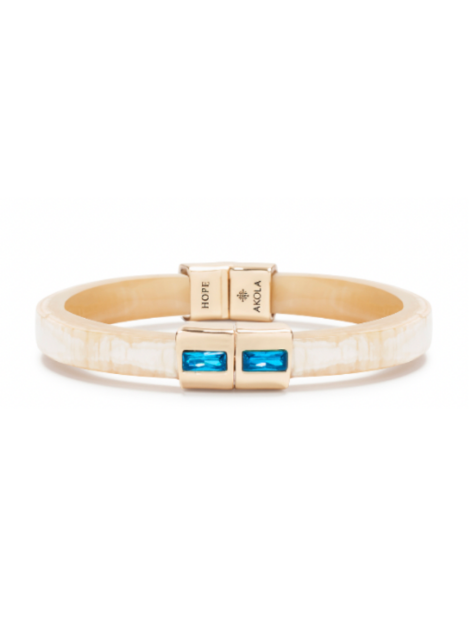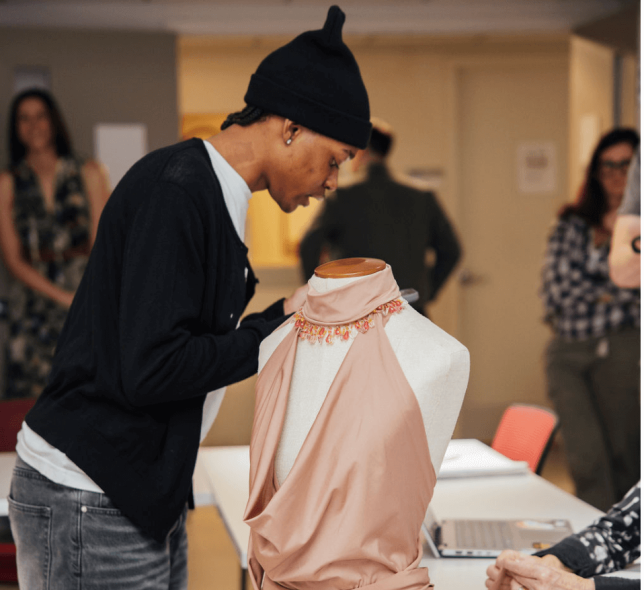This article is part of a series of interviews conducted by LIM students with winners of the Accessories Council's 2021 Design Excellence Awards (DEA). Students are enrolled in the College's Introduction to the Fashion Business classes.
Akola is a women-owned business that focuses on sustainability responsible material sourcing, and handcraftsmanship. Their Unlock-it bracelet is beautifully made from their signature horn material with a clasp that seamlessly opens and closes with a colorful gemstone.
To start the interview we asked Lesli what the inspiration was for creating the infamous Unlock-it bracelet. She responded by explaining how their story went back 20 years with Brittany Merrill Underwood, CEO of Akola, who took a trip to Uganda. There she met Sarah. Sarah was a survivor of the Uganda Civil War and lived a completely different life from Brittany. The same age as her, Sarah was caring for 18 kids at the time, while Underwood lived a “privileged life.” This encounter changed her life and pushed her to create ethical, handmade jewelry pieces that are created by women in Uganda, allowing Underwood to empower women in Uganda.
“The idea for the company came from the story of Sarah. At Akola we to continue to connect with the women in Uganda and women here as well. We want the jewelry these women make to be personal to them,” shared Lesli.
We were interested in hearing the process of making Akola jewelry and how long each piece takes on average, since they are all made and carved by hand. Lesli explained, “Each bead takes ten minutes to be rolled and is passed to several women to be inspected, dyed, braided, and rolled.”
When we read about Akola's mission on the website, we learned that Ugandan women made
the original jewelry pieces under trees. We were curious to hear if that was still the case. While still keeping true to their brand of handcraftsmanship and authenticity, their products are still made in Uganda by women. They now have a building in Uganda as well as huts for the women to work safely in.
From Akola's website, we also learned that the company uses safe, responsibly sourced, and ethical raw materials for their Unlock-it bracelets and other jewelry pieces. We wanted to learn more about the process of obtaining, designing, and the overall process of using these tools. “The Akola cow horn is our number one material. We cut carve and boil the bone to use it for our bangles” Lesli said. The company also used recycled glass, palm leaves that are cut and dyed, sickle from guava plants, and natural gemstones. Hearing about the natural materials that they use felt like a breath of fresh air, after the fashion industry has used and abused many resources to make manmade synthetic materials.
For our next question, we asked Gabor about the inspiring mission of supporting women at Akola. She told us how the company focuses on giving back to their employees in Uganda by paying them livable wages, educating their children and collaborating with other women-owned businesses. “Every purchase has a direct social impact,” Lesli added.
For our final question, we asked Lesli if she had any advice to bestow on us as aspiring fashion professionals. She told us to stay curious and aware of what is happening around us. “Know your DNA and stay true to yourself. Maintain connections and understand that no means no for now”.
We greatly appreciate the time Lesli Gabor spent with us. We both left with a newfound love for the brand and their inspiring mission. Akola has gained two giant fans who cannot wait to see what other artistic ideas they come up with.






